Introduction to the Intel&Altera FPGA series
Since Altera was acquired by Intel in June 2015,Intel FPGA mainly has 5 series, namely: Agilex, Stratix, Arria, MAX, Cyclone series, and each series has different small series (we call them secondary series) according to different applications, because some secondary series chips It has already been discontinued. When we introduce, we will start from the latest of the second-level series, introduce forward, and introduce until the end of the commonly used series.
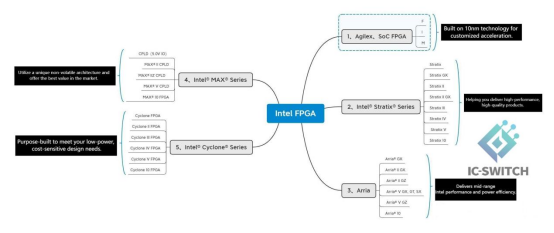
Among them, the Agilex series is a series of FPGA launched after Intel acquired Altera, and other series are basically series of FPGA when Altera was not acquired.
Agilex series FPGA
The Intel Agilex™ FPGA series can be regarded as Xilinx Ultrascale+ series benchmark products from a strategic position.
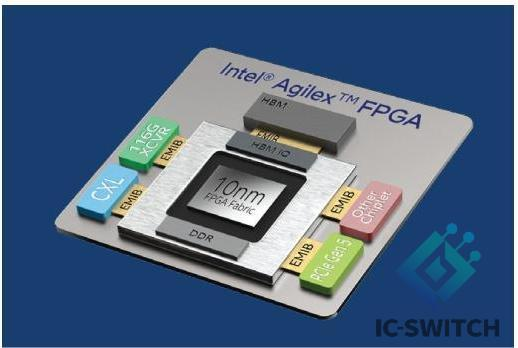
The Intel Agilex™ FPGA series combines Intel's 10nm SuperFin process technology, a 3D heterogeneous system-in-package (SiP) integrated with Intel's proprietary Embedded Multi-Die Interconnect Bridge (EMIB), and an innovative chip-based This application provides customized connection and acceleration functions.
This new architecture enables FPGA fabrics to be combined with specialized logic blocks such as transceivers, processor interfaces, optimized I/O, custom computing, Intel ® eASIC™ devices, and many other features to create solutions that are uniquely optimized for each application. Intel Agilex SoC FPGA also integrate a quad-core Arm* Cortex-A53 processor to provide a high level of system integration.
Intel Agilex™ 7 FPGA are divided into the following three main families, the main ones are as follows:

Agilex FPGA: F-series
Intel Agilex F-Series FPGA and SoC FPGA integrate transceivers with up to 58 Gbps bandwidth, enhanced DSP capabilities, high system integration, and 2nd generation Intel Hyperflex architecture for a variety of applications in the data center, network, and edge. The Intel Agilex F-series FPGA and SoC family also offers the option to integrate a quad-core Arm* Cortex-A53 processor for high system integration.
product brief table:

Agilex FPGA: I-series
Intel Agilex I-Series SoC FPGA are optimized for high-performance processor interfaces and bandwidth-intensive applications. Compute Express Link provides consistent connectivity for Intel Xeon processors, enhanced PCIe* Gen 5 support, and transceivers with bandwidths up to 112 Gbps, making Intel Agilex I-Series SoC FPGA ideal for applications requiring significant interface bandwidth and high performance.
product brief table:
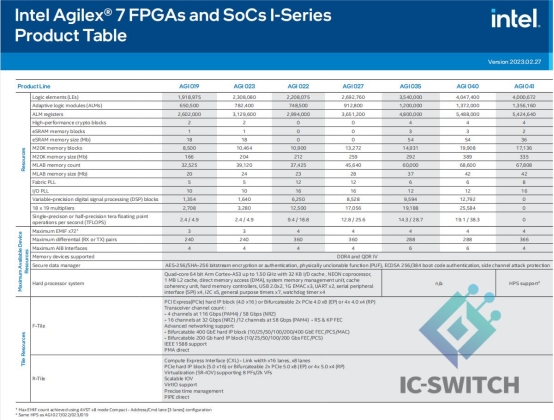
Agilex FPGA: M-series
Intel Agilex M-series SoC FPGA are optimized for compute-intensive and memory-intensive applications. Intel Agilex M-series SoC FPGA provide consistent connectivity for Intel Xeon processors, HBM integration, enhanced DDR5 controllers, and Intel Optane DC persistent memory support, optimized for data-intensive applications that require large amounts of memory and high bandwidth.
product brief table:
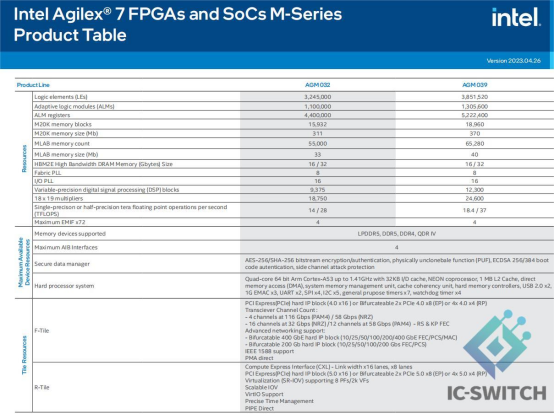
Naming conventions for Agilex FPGA

Stratix FPGA

Stratix 10 FPGA and SoC Hard Processor Systems (HPS)
Intel Stratix® 10 SoC Hard Processor System (HPS) is Intel's industry-leading third-generation HPS. Using Intel's 14-nm tri-gate technology performance, the Intel Stratix 10 SoC device uses an integrated quad-core 64-bit ARM Cortex-A53 to achieve twice the performance of the previous generation SoC. HPS also enables system-wide hardware virtualization by adding a system memory management unit. These architectural improvements ensure that the Intel Stratix® 10 SoC will meet the requirements of current and future embedded markets, including wireless and wired communications, data center acceleration, and numerous military applications.
Stratix 10 FPGA naming conventions
Stratix 10 (GX, SX,) Devices
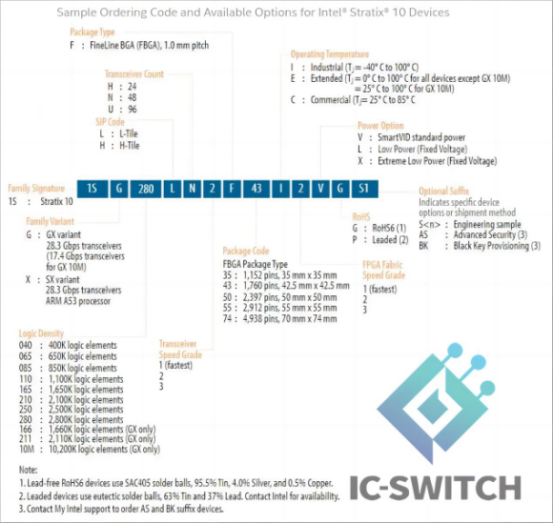
Stratix V-Series FPGA naming conventions
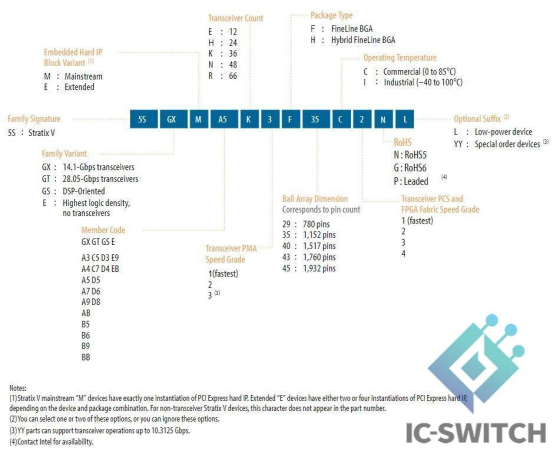
Intel Cyclone FPGA
This series should be strategically targeted at the Xilinx S-series.
This series of FPGA should be the most well-known to everyone, Altera mainly promotes the series, many university course design uses FPGA should be Altera Cyclone series FPGA, and many people's enlightenment FPGA should also be this series of FPGA (many development boards are this series of FPGA), the information needless to say.

Intel Cyclone 10 was basically annihilated by other series, like the Xilinx S7 series, just 'existed', the low-end basically used the MAX 10 series, and the high-end will not use the series.
Intel Cyclone 10 FPGA series naming conventions
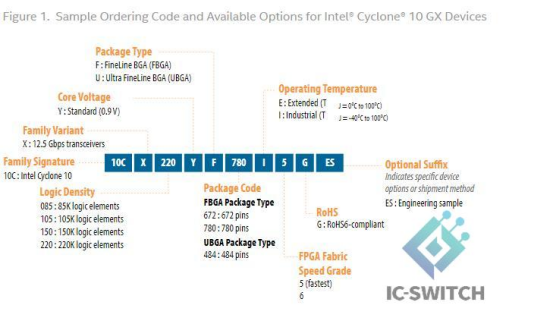

Intel Cyclone V-series FPGA
Cyclone® V FPGA offer the industry's lowest system cost and power, as well as new levels of performance, making the device family ideal for highlighting the benefits of your high-volume applications. With up to 40% lower overall power consumption than previous generations, you also get efficient logic integration capabilities, integrated transceiver variants, and SoC FPGA variants, including ARM*-based hard processor systems (HPS).
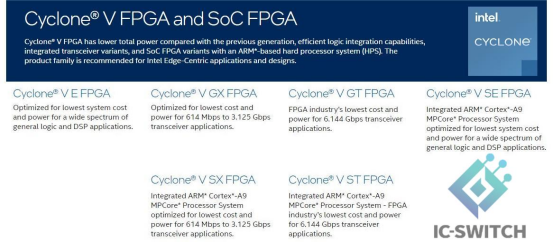
Cyclone® V SoC FPGA Architecture
Cyclone® V SoC FPGA devices offers a powerful dual-core ARM* Cortex*-A9 MPCore* processor surrounded by a rich set of peripherals and a hardened memory controller. The FPGA fabric, with up to 110K LEs (logic elements), is connected to the hard processor system (HPS) through a high-speed 100 Gbps interconnect backbone.
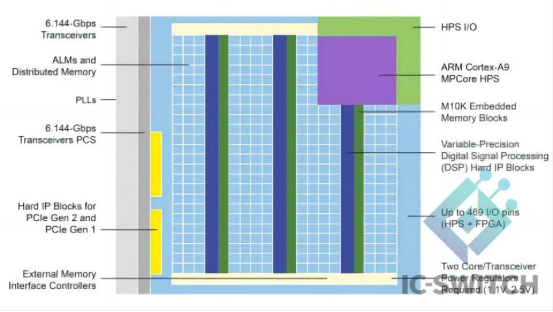
Product list:
Product Name | Launch Date | Logic Elements (LE) | Digital Signal Processing (DSP) Blocks | Maximum Embedded Memory | Maximum User I/O Count | Package Options |
5CEA2 FPGA | 2011 | 25000 | 25 | 1.956 Mb | 224 | M383, U324, U484, F256, F484 |
5CEA4 FPGA | 2011 | 49000 | 66 | 3.383 Mb | 224 | M383, U324, U484, F256, F484 |
5CEA5 FPGA | 2011 | 77000 | 150 | 4.884 Mb | 224 | M383, U484, F484 |
5CEA7 FPGA | 2011 | 149500 | 156 | 7.696 Mb | 480 | M484, U484, F484, F672, F896 |
5CEA9 FPGA | 2011 | 301000 | 342 | 13.917 Mb | 480 | U484, F484, F672, F896 |
5CGTD5 FPGA | 2011 | 77000 | 150 | 4.884 Mb | 336 | M301, M383, U484, F484, F672 |
5CGTD7 FPGA | 2011 | 149500 | 156 | 7.696 Mb | 480 | M484, U484, F484, F672, F896 |
5CGTD9 FPGA | 2011 | 301000 | 342 | 13.917 Mb | 560 | U484, F484, F672, F896, F1152 |
5CGXC3 FPGA | 2011 | 35500 | 57 | 1.641 Mb | 208 | U324, U484, F484 |
5CGXC4 FPGA | 2011 | 50000 | 70 | 2.795 Mb | 336 | M301, M383, U484, F484, F672 |
5CGXC5 FPGA | 2011 | 77000 | 150 | 4.884 Mb | 336 | M301, M383, U484, F484, F672 |
5CGXC7 FPGA | 2011 | 149500 | 156 | 7.696 Mb | 480 | M484, U484, F484, F672, F896 |
5CGXC9 FPGA | 2011 | 301000 | 342 | 13.917 Mb | 560 | U484, F484, F672, F896, F115 |
5CSEA2 FPGA | 2012 | 25000 | 36 | 1.538 Mb | 145 | U484, U672 |
5CSEA4 FPGA | 2012 | 40000 | 84 | 2.931 Mb | 145 | U484, U672 |
5CSEA5 FPGA | 2012 | 85000 | 87 | 4.45 Mb | 288 | U484, U672, F896 |
5CSEA6 FPGA | 2012 | 110000 | 112 | 6.191 Mb | 288 | U484, U672, F896 |
5CSTD5 FPGA | 2012 | 85000 | 87 | 4.45 Mb | 288 | F896 |
5CSTD6 FPGA | 2012 | 110000 | 112 | 6.191 Mb | 288 | F896 |
5CSXC2 FPGA | 2012 | 25000 | 36 | 1.538 Mb | 145 | U672 |
5CSXC4 FPGA | 2012 | 40000 | 84 | 2.931 Mb | 145 | U672 |
5CSXC5 FPGA | 2012 | 85000 | 87 | 4.45 Mb | 288 | U672, F896 |
5CSXC6 FPGA | 2012 | 110000 | 112 | 6.191 Mb | 288 | U672, F896 |
Intel Cyclone V Series FPGA Naming Rules
Cyclone V E
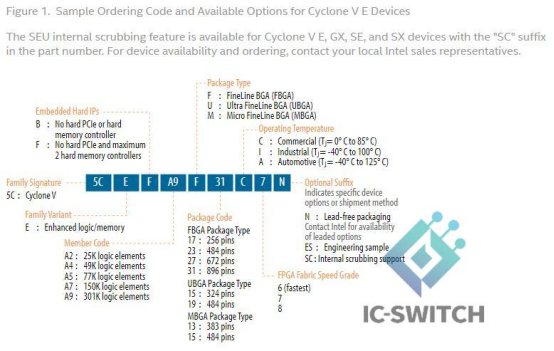
Cyclone V GX
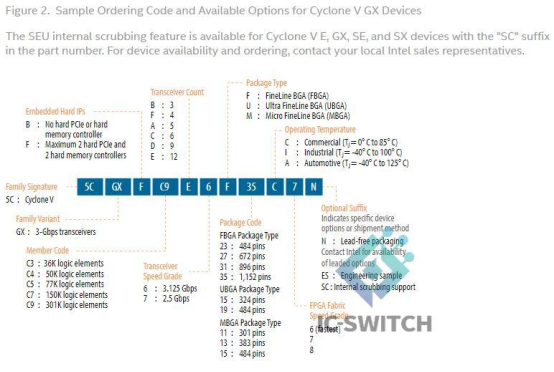
Cyclone V GT
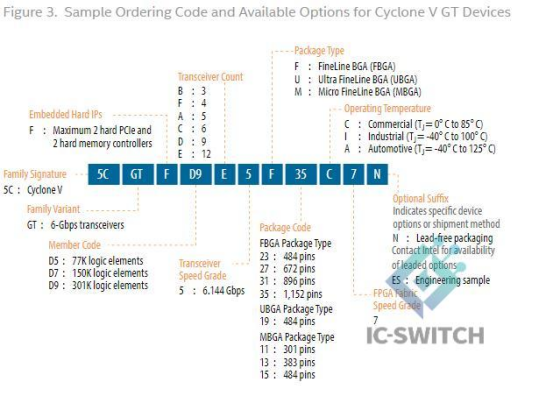
Cyclone V SE
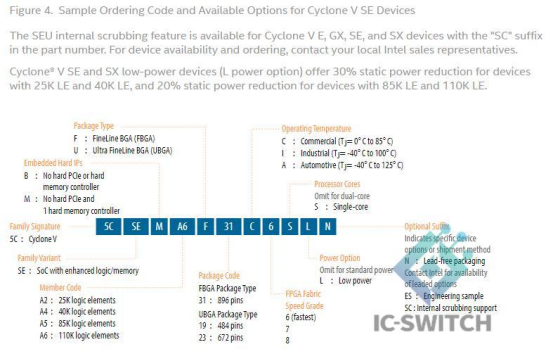
Cyclone V SX
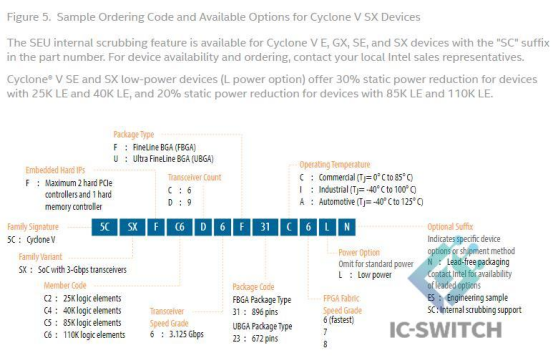
Cyclone V ST
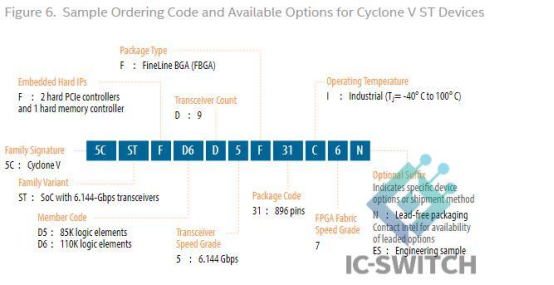
Intel Cyclone IV-series FPGA
Cyclone II, Cyclone III has been gradually eliminated, the current commonly used is Cyclone IV, most of the development boards on the market are based on this series, beginners are highly recommended.
Cyclone IV Architecture:
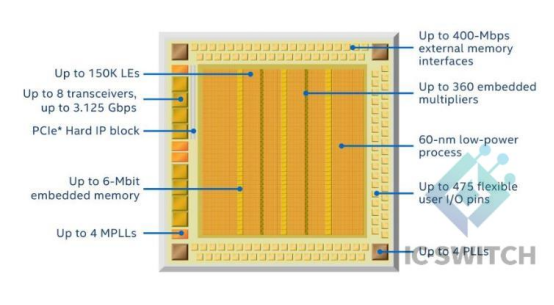
Intel Cyclone IV Series FPGA Naming Rules
Cyclone IV GX
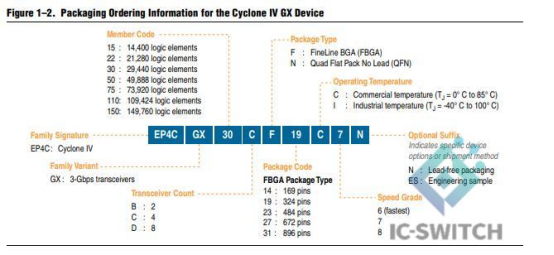
Cyclone IV E

This is the end of the Intel/Altera series FPGA introduction. IC-SWITCH has a large number of Intel FPGAs in stock, online inquiry, and quick response.